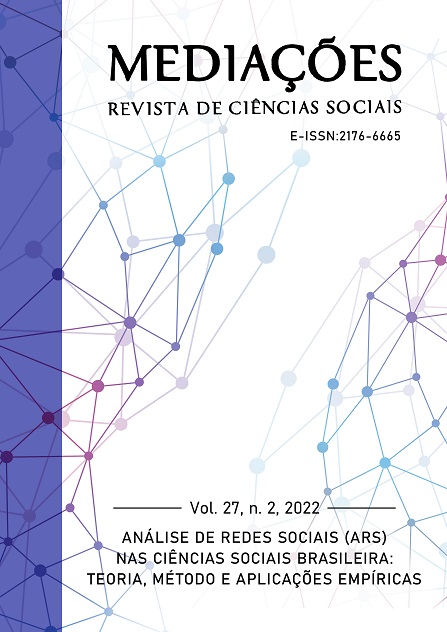Surveillance Capitalism in an Age of Neoliberal Rationality
DOI:
https://doi.org/10.5433/2176-6665.2022v27n2e45698Keywords:
Surveillance, Capitalism, Neoliberalism, Rationality, Human CapitalAbstract
The Surveillance Capitalism concept explains the capitalist accumulation logic of large digital companies in tracking internet users, extracting personal data and in changing behavior. This article aims to question the concept from a perspective that considers the participation of internet users in their own surveillance. The proposed new approach results from the conception of neoliberalism as the rationality of the contemporary capitalism that requires a new subjective order anchored in the production of a society formed by enterprise units involved constantly in the development of their human capital to compete in social relationships in all spheres of existence. Accordingly, it is believed that the online surveillance conducted by the large corporations and the expropriation of the human experience that results is only one part of the story. The other part is the perpetual search for individuals performance in relationships with others and with themselves.
Downloads
References
BALL, Kirstie. Exposure: Exploring the Subject of Surveillance. Information, Communication & Society, London, v. 12, n. 5, p. 639-657, 2009. Available at: https://www.tandfonline.com/doi/pdf/10.1080/13691180802270386?needAccess=true. Accessed at: jun. 13, 2022. DOI: https://doi.org/10.1080/13691180802270386
BAUMAN, Zygmunt; LYON, David. Liquid surveillance. Cambridge: Polity, 2013.
BROWN, Wendy. In the ruins of neoliberalism: the rise of antidemocratic politics in the west. New York: Columbia University Press, 2019. DOI: https://doi.org/10.7312/brow19384
BROWN, Wendy. Undoing the demos: neoliberalism’s stealth revolution. New York: Zone books, 2015. (Near Futures Series). DOI: https://doi.org/10.2307/j.ctt17kk9p8
DARDOT, Pierre; LAVAL, Christian. Common: on revolution in the 21st century. London: Bloomsbury Academic, 2019.
DARDOT, Pierre; LAVAL, Christian. The new way of the world: on neoliberal society. Translated by Gregory Elliott. London: Verso, 2014.
DELEUZE, Gilles. Negotiations 1972-1990. Translated by Martin Joughin. New York: Columbia University Press, 1997.
D'URBINO, Kuca. Big tech’s covid-19 opportunity. The Economist, London, apr. 4, 2020. Available at: https://www.economist.com/leaders/2020/04/04/big-techs-covid-19-opportunity. Accessed at: 13 jun. 2022.
FOUCAULT, Michel. Discipline and punish: the birth of the prison. New York: Pantheon Books, 1977.
FOUCAULT, Michel. History of sexuality. New York: Pantheon Books, 1978. v. 1: an introduction. Available at: https://suplaney.files.wordpress.com/2010/09/foucault-the-history-of-sexuality-volume-1.pdf. Accessed at: jun. 13, 2022.
FOUCAULT, Michel. Security, Territory, population. New York: Picador, 2009. v. 6: Michel Foucault Lectures at the Collège de France 1977-1978.
FOUCAULT, Michel. Society must be defended. New York: Picador, 2003. v. 5: Michel Foucault Lectures at the Collège de France 1977-1978.
FOUCAULT, Michel. The birth of biopolitics. New York: Picador, 2010. v. 7: Michel Foucault Lectures at the Collège de France 1977-1978.
HAGGERTY, Kevin D. Tear down the Walls: on demolishing the panopticon. In: LYON, David (org.). Theorizing Surveillance: the panopticon and beyond. London: Willan Publishing, 2006. p. 23.
HARCOURT, Bernard E. Exposed: desire and disobedience in the digital age. Cambridge: Harvard University Press, 2015. DOI: https://doi.org/10.4159/9780674915077
HARVEY, David. A brief history of neoliberalism. Oxford: Oxford University Press, 2007.
HARVEY, David. The enigma of capital and the crises of capitalism. London: Profile Books, 2011.
KLEIN, Naomi. The shock doctrine: the rise of disaster capitalism. New York: Picador, 2008. DOI: https://doi.org/10.1177/194277860800100215
LUXEMBURG, Rosa. The accumulation of capital. Translated by Agnes Schwarzschild. Eastford: Martino Fine Books, 2015.
LYON, David. Surveillance Culture: Engagement, Exposure, and Ethics in Digital Modernity. International Journal of Communication, Los Angeles, v. 11, n. 1, p. 824-842, 2017. Available at: https://ijoc.org/index.php/ijoc/article/viewFile/5527/1933. Accessed at: jun. 13, 2022.
LYON, David. The culture of surveillance: watching as a way of life. Cambridge: Polity Press, 2018.
MANOKHA, Ivan. Surveillance, panopticism, and self-discipline in the Digital Age. Surveillance and Society, Chapel Hill, v. 16, n. 2, p. 219-237, 2018. Available at: https://ojs.library.queensu.ca/index.php/surveillance-and-society/article/view/8346/7674. Accessed at: 13 jun. 2022. DOI: https://doi.org/10.24908/ss.v16i2.8346
MARWICK, Alice E.; BOYD, Danah. I Tweet Honestly, I Tweet Passionately: twitter users, context collapse and the imagined audience. New Media & Society, Thousand Oaks, v. 13, n. 1, p. 114-133, 2010. Available at: https://journals.sagepub.com/doi/pdf/10.1177/1461444810365313. Accessed at: 13 jun. 2022. DOI: https://doi.org/10.1177/1461444810365313
MARX, Karl. Capital: A Critique of Political Economy. Overland Park: Digi Reads, 2017. v 1.
POLANYI, Karl. The Great Transformation: the political and economic origins of our time. Boston: Beacon Press, 2001. Available at: https://inctpped.ie.ufrj.br/spiderweb/pdf_4/Great_Transformation.pdf. Accessed at: 13 jun. 2022.
ZUBOFF, Soshana. Big other: surveillance capitalism and the prospects of an information civilization. Journal of Information Technology, London, v. 30, p. 75-89, 2015. Available at: https://journals.sagepub.com/doi/pdf/10.1057/jit.2015.5. Accessed at: 13 jun. 2022. DOI: https://doi.org/10.1057/jit.2015.5
ZUBOFF, Soshana. The Age of Surveillance Capitalism: the fight for a human future at the new frontier of power. New York: Public Affairs, 2019.
Downloads
Published
How to Cite
Issue
Section
License
Copyright (c) 2022 Iafet Leonardi Bricalli

This work is licensed under a Creative Commons Attribution 4.0 International License.
Copyright on articles published in Mediações belongs to the author(s): in the case of partial or entire republication of the original publication, we ask author(s) to indicate the original publication in the periodical.
Mediações uses the Creative Commons Attribution 4.0 International license, which allows Open Access, enabling any user to read, download, copy and disseminate its content so long as adequately referenced.
The opinions expressed by the author(s) are their sole responsibility.
































